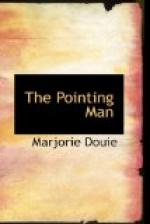“I made a posy, while
the days ran by;
Here will I smell my remnant
out, and tie
My
life within this band.
But Time did beckon to the
flowers, and they,
By noon, most cunningly did
steal away,
And
wither’d in my hand.”
He read the lines over and over again, and gave a deep, heart-broken sigh, bending his face between his hands, and bowing his shoulders as though under a heavy weight. His gaunt frame was thin and spare, his black alpaca coat hung on it like a sack, and his whole attitude spoke of sorrow. He might have been the presentment of an unwilling ghost, who stood with the Ferryman’s farthing under his palm, waiting to be taken across the cheerless, dark waters to a limbo of drifting souls. He took his hands from before his face and clasped them over the book, looking out of the window to the evening shadows, as if he tried to find peace in the very act of contemplation.
The sad things he came in daily contact with had conquered his faith in life, though they had not succeeded in killing his trust in God’s eventual plan of redemption; and his mind wandered in terrible places, places he had forced his way into, places he could never forget. He suffered from all a reformer’s agony, an agony that is the small reflection of the great story of the mystic burden heavy as the sins of the whole world, and he tried, out of the simple, childlike fancy of the words he read, to grasp at a better mind.
Heath was one of those men who could not understand effortless faith; he was crushed by his own lack of success, and bowed down by his own failure. Since he could not rout the enemy single-handed, he believed that the battle was against the Hosts of the Lord. He knew no leisure from the war of his own thoughts, and as he clasped his hands, his face grew tense and set, and his eyes haggard and terrible. For a moment he sat very still, and his eyes followed the lines written by a man who had the faith of a little child:
“But Time did beckon
to the flowers, and they,
By noon, most cunningly did
steal away.”
Heath had never gathered flowers, either as a lesson to himself or a gift for others; they hardly spoke of careless beauty to him, they were emblems of lightness and thoughtlessness, and Heath had no time to stop and consider the lilies of the field.
He moved suddenly like a man who is awakened from a thought heavier than sleep, and listened with a hunted look, the look of a man who is afraid of footsteps; he stood up, gathering his loose limbs together and watching the door. Steps came up the staircase, steps that stumbled a little, and if Heath had possessed Mhtoon Pah’s art of reading the walk of his fellow creatures, he would have known that he might expect a woman and not a man.
“Mr. Heath,” a low voice called in the passage, and Heath’s tension relaxed, giving place to surprise.
The voice was strange to him, and he passed his handkerchief over his face and walked to the door, just as his name was called again, in the same low, penetrating voice.




